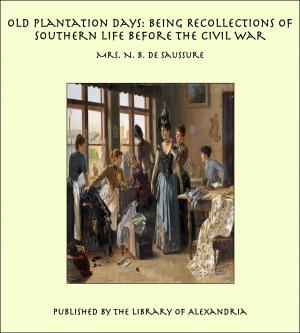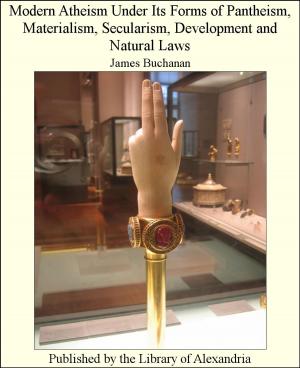Dorothy South: A Love Story of Virginia Just Before the War
Nonfiction, Religion & Spirituality, New Age, History, Fiction & Literature| Author: | George Cary Eggleston | ISBN: | 9781465620231 |
| Publisher: | Library of Alexandria | Publication: | March 8, 2015 |
| Imprint: | Language: | English |
| Author: | George Cary Eggleston |
| ISBN: | 9781465620231 |
| Publisher: | Library of Alexandria |
| Publication: | March 8, 2015 |
| Imprint: | |
| Language: | English |
IT was a perfect day of the kind that Mr. Lowell has celebrated in song—“a day in June.” It was, moreover, a day glorified even beyond Mr. Lowell’s imagining, by the incomparable climate of south side Virginia. A young man of perhaps seven and twenty, came walking with vigor down the narrow roadway, swinging a stick which he had paused by the wayside to cut. The road ran at this point through a luxuriantly growing woodland, with borders of tangled undergrowth and flowers on either side, and with an orchestra of bird performers all around. The road was a public highway, though it would never have been taken for such in any part of the world except in a south side county of Virginia in the late fifties. It was a narrow track, bearing few traces of any heavier traffic than that of the family carriages in which the gentle, high-born dames and maidens of the time and country were accustomed to make their social rounds. There was a gate across the carriage track—a gate constructed in accordance with the requirement of the Virginia law that every gate set up across a public highway should be “easily opened by a man on horseback.” Near the gate the young man slackened his vigorous pace and sat down upon a recently fallen tree. He remembered enough of his boyhood’s experience in Virginia to choose a green log instead of a dry one for his seat. He had had personal encounters with chigoes years ago, and wanted no more of them. He sat down not because he was tired, for he was not in the least so, but simply because, finding himself in the midst of a refreshingly and inspiringly beautiful scene, he desired to enjoy it for a space. Besides, he was in no hurry. Nobody was expecting him, and he knew that dinner would not be served whither he was going until the hour of four—and it was now only a little past nine. The young man was fair to look upon. A trifle above the medium height, his person was symmetrical and his finely formed head was carried with an ease and grace that suggested the reserve strength of a young bull. His features were about equally marked by vigor and refinement. His was the countenance of a man well bred, who, to his inheritance of good breeding had added education and such culture as books, and earnest thinking, and a favorable association with men of intellect are apt to bring to one worthy to receive the gift. He seemed to know the spot wherein he lingered. Indeed he had asked no questions as to his way when less than an hour ago he had alighted from the pottering train at the village known as the Court House. He had said to the old station agent, “I will send for my baggage later.” Then he had set off at a brisk walk down one of the many roads that converged at this centre of county life and affairs. The old station master, looking after him, had muttered: “He seems to think he knows his way. Mebbe he does, but anyhow he’s a stranger in these parts.”
IT was a perfect day of the kind that Mr. Lowell has celebrated in song—“a day in June.” It was, moreover, a day glorified even beyond Mr. Lowell’s imagining, by the incomparable climate of south side Virginia. A young man of perhaps seven and twenty, came walking with vigor down the narrow roadway, swinging a stick which he had paused by the wayside to cut. The road ran at this point through a luxuriantly growing woodland, with borders of tangled undergrowth and flowers on either side, and with an orchestra of bird performers all around. The road was a public highway, though it would never have been taken for such in any part of the world except in a south side county of Virginia in the late fifties. It was a narrow track, bearing few traces of any heavier traffic than that of the family carriages in which the gentle, high-born dames and maidens of the time and country were accustomed to make their social rounds. There was a gate across the carriage track—a gate constructed in accordance with the requirement of the Virginia law that every gate set up across a public highway should be “easily opened by a man on horseback.” Near the gate the young man slackened his vigorous pace and sat down upon a recently fallen tree. He remembered enough of his boyhood’s experience in Virginia to choose a green log instead of a dry one for his seat. He had had personal encounters with chigoes years ago, and wanted no more of them. He sat down not because he was tired, for he was not in the least so, but simply because, finding himself in the midst of a refreshingly and inspiringly beautiful scene, he desired to enjoy it for a space. Besides, he was in no hurry. Nobody was expecting him, and he knew that dinner would not be served whither he was going until the hour of four—and it was now only a little past nine. The young man was fair to look upon. A trifle above the medium height, his person was symmetrical and his finely formed head was carried with an ease and grace that suggested the reserve strength of a young bull. His features were about equally marked by vigor and refinement. His was the countenance of a man well bred, who, to his inheritance of good breeding had added education and such culture as books, and earnest thinking, and a favorable association with men of intellect are apt to bring to one worthy to receive the gift. He seemed to know the spot wherein he lingered. Indeed he had asked no questions as to his way when less than an hour ago he had alighted from the pottering train at the village known as the Court House. He had said to the old station agent, “I will send for my baggage later.” Then he had set off at a brisk walk down one of the many roads that converged at this centre of county life and affairs. The old station master, looking after him, had muttered: “He seems to think he knows his way. Mebbe he does, but anyhow he’s a stranger in these parts.”















